Marko Fakin Successfully Presents Exquisite Wines in New York
March the 3rd, 2023 - For Croatian winemakers, entering the American market represents a significant step forward in their business and gaining global recognition for wine. The Fakin Winery, one of the leading and multiple award-winning Croatian wineries from the village of Bataji at the foot of Motovun, gains a place on the wine map of the world.
The Fakin winery nurtures the typical Istrian grape varieties Malvazija, Teran and Muscat, currently has nine active wine labels, some of which it presented to the American market in February, at several organized tastings and wine presentations in New York.
Members of the Istria Sports Club in New York enjoyed tasting selected Fakin wines. They learned more about the production and family tradition of winemaking through a short presentation and gathering in Astoria, Queens.
“Members of the Istrian Club and guests are extremely honored and grateful that the Fakin family joined our community by presenting and tasting their wines and that they brought the love of Istria to New York. It was a pleasure meeting this family, which produces excellent autochthonous wines with such a great passion and dedication," said Susan Karlic, Head of the Istria Sports Club.
As part of the special Food and Wine Stories of Croatia event on February 21 in the Villa Berulia restaurant, Marko Fakin presented his Malvazija Istarska and Teran to experts, journalists and sommeliers, and all interested wine lovers, who had the opportunity to meet the Fakin family and taste Istrian wines with a dinner of four courses of carefully selected dishes that went perfectly with the selected wines. The evening was also attended by the Consul General of the Republic of Croatia in New York, Mr. Nikica Kopačević: "The Croatian Consulate is proud of the arrival of Croatian winemakers on the American market."
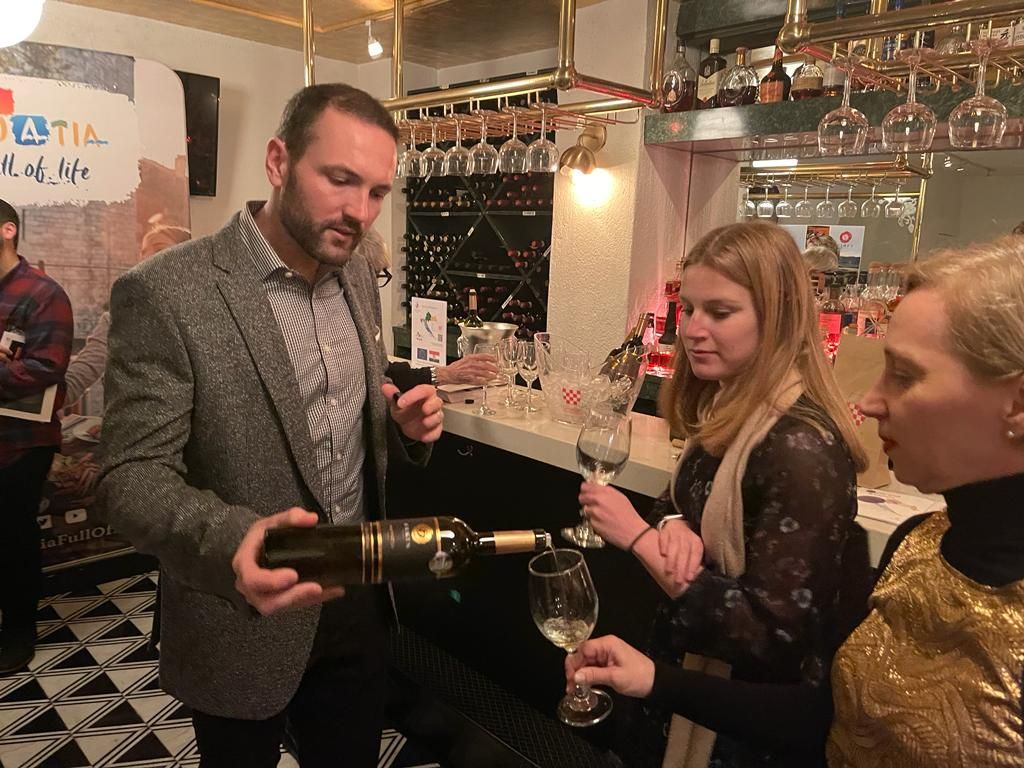
Mrs. Leila Krešić-Jurić, Director for North America of the Croatian Tourist Board, also supported the Fakin family with her attendance, pointing out: "This is the first presentation called Food and Wines of Croatia that we are organizing with the Croatian Premium Wine Imports company in order to present Croatia as a destination with authentic food and autochthonous wine varieties. Namely, apart from the visual presentation, this is what we can best use to evoke the destination and attract American guests. This is because they highly appreciate the quality of food and drinks. The response of journalists and educators about Croatia as a wine destination was excellent, with more than 20 representatives of the profession and media from New York enjoying Fakin wines."
The owner of the restaurant Villa Berulia, Alexandra Ivanac, also expressed her satisfaction after the successful dinner: "It was a true pleasure for us to host Marko and his wonderful family and present their fantastic wines to our guests. We are always proud and grateful when we can support Croatians and their families. We really want many more successes like this."
Marko presented his fresh Malvazia, fresh Teran, aged Teran Il Primo and Muscat yellow, along with selected gastronomic specialties, at the konoba Vinoteka 46 in Huntington, Long Island, on February 25. Their host and owner of Vinoteka 46, Danijel Pedišić, emphasized on that occasion: "It was such an honor for us to host the Fakin family in our restaurant. Croatian wines are increasingly accepted in the USA, and always especially by the Croatian American community. I believe that the sale of Croatian wines will grow year by year in the USA and that we will have many more events like this with Croatian winemakers."
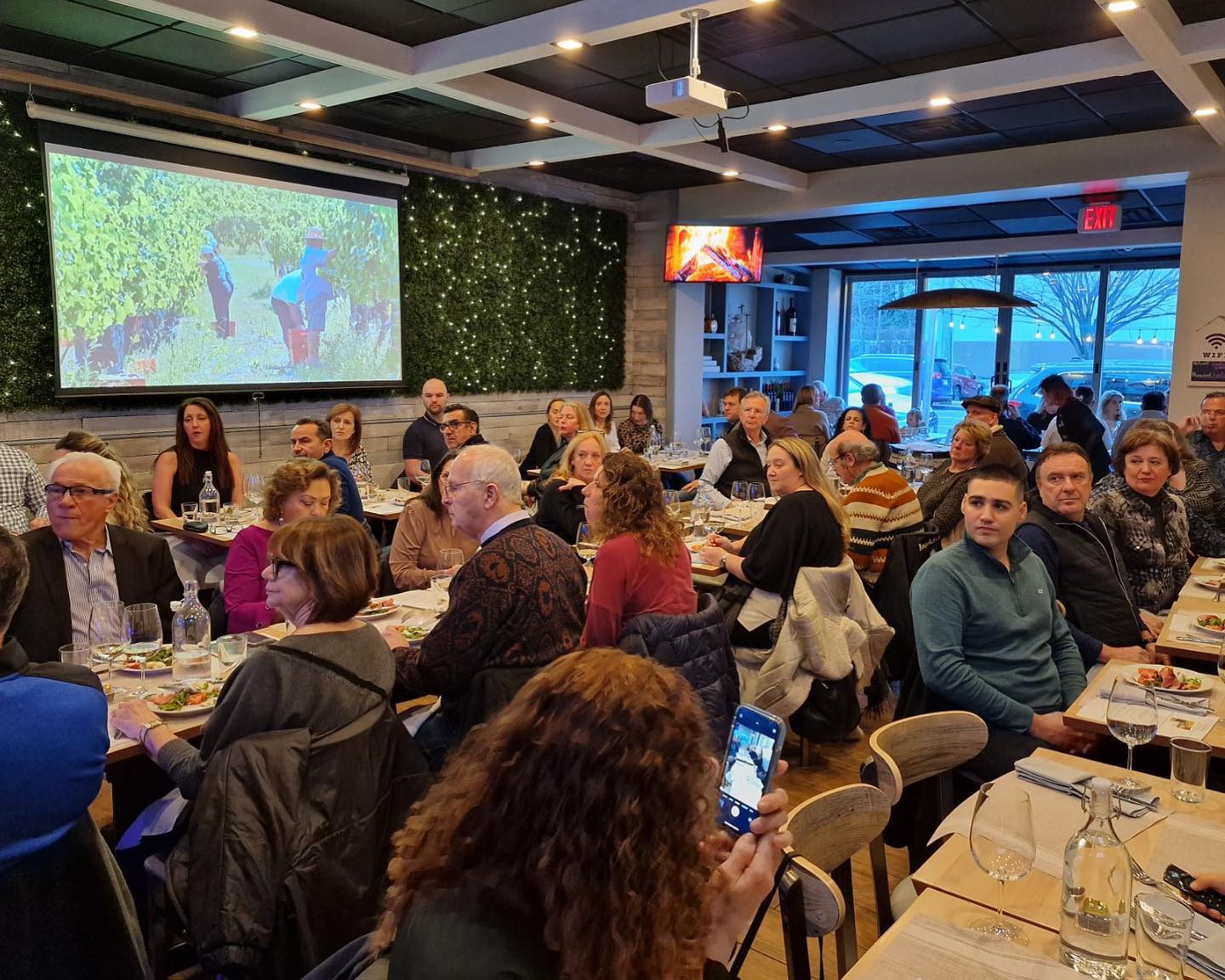
Marko Fakin concluded his trip to New York as a live guest at Croatian Radio New York on February 25. During the broadcast of the Voice of Free Croatia hosted by Petra Pesa, he talked about his winery, top wines and autochthonous varieties he grows, and shared history, stories and traditions of his family.
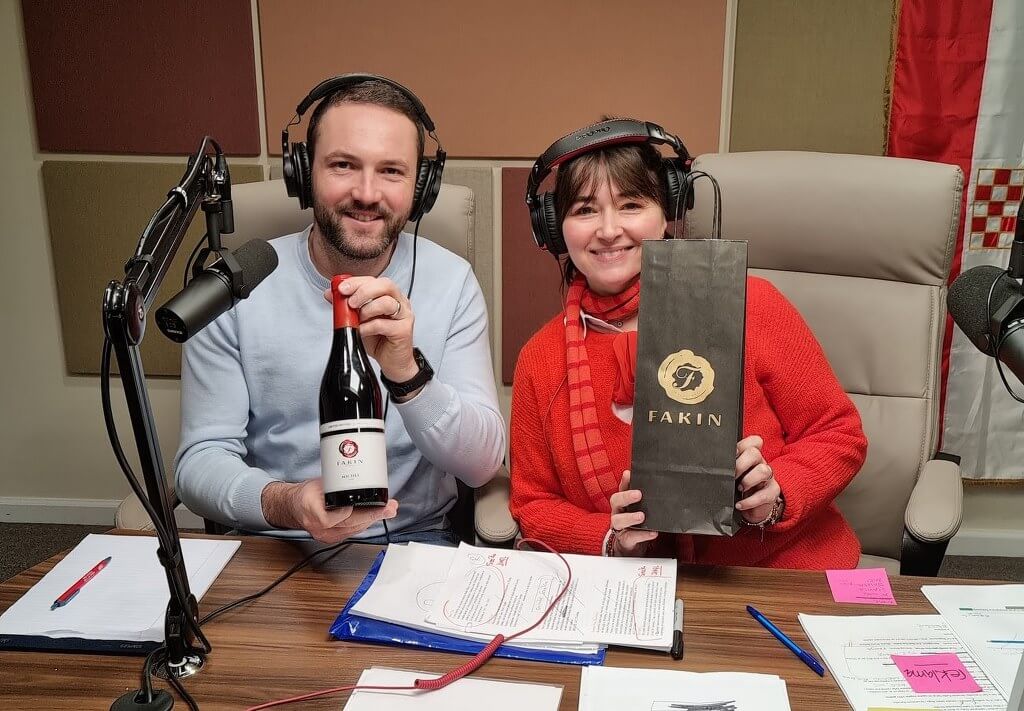
"We are very happy that we had the opportunity to present our wines in New York, to media representatives, sommeliers, our Croats in the USA, and all the wine lovers who came to support us and enjoy socializing, a tasty bite and a delicious drop with us. For organizing wonderful evenings and gatherings, we would like to thank the Istrian Sports Club, the restaurant Villa Berulia, and the konoba Vinoteka 46 for the hospitality they provided. A special and very sincere thanks to the company Croatian Premium Wine Imports headed by Mrs. Mirena Bagur for the exceptional help and cooperation during our trip. "Thank you TZ Istra and Vinistri for your constant support," Marko Fakin commented after his very successful visit to New York.
"In order to be able to create a category of Croatian wines in shops and restaurants, we as importers, winemakers and all wine and tourist institutions, such as HTZ in New York, TZ Istria and Vinistra, with whom we cooperate, need to strategically educate the market about Croatian autochthonous varieties. For this, it is necessary not only top wines such as the different varieties of Malvasia and Terano of the Fakin Winery, but also the knowledge, will and hard work of how to present them, and this is where Marko and Bety Fakin excel with their professionalism and approach," said Mirena Bagur, co-founder of Croatian Premium Wine Imports, Inc., a company that imports and distributes Croatian autochthonous wines in the USA.
The culture of producing top quality Fakin wines is the result of specific Motovun soil, a favorable climate with lots of sun and lots of wind, along with a great knowledge of our own grapes, but also experience, dedication and long-standing family traditions that ensure the top quality of carefully cultivated varieties.
As a winery from Croatia that has won a gold medal at Decanter, the largest and most important world wine competition, for six years in a row, and in addition to being an unmissable place for complete eno-gastro enjoyment, the Fakin winery is surely and resolutely building its way to the top of the domestic and international wine scene.
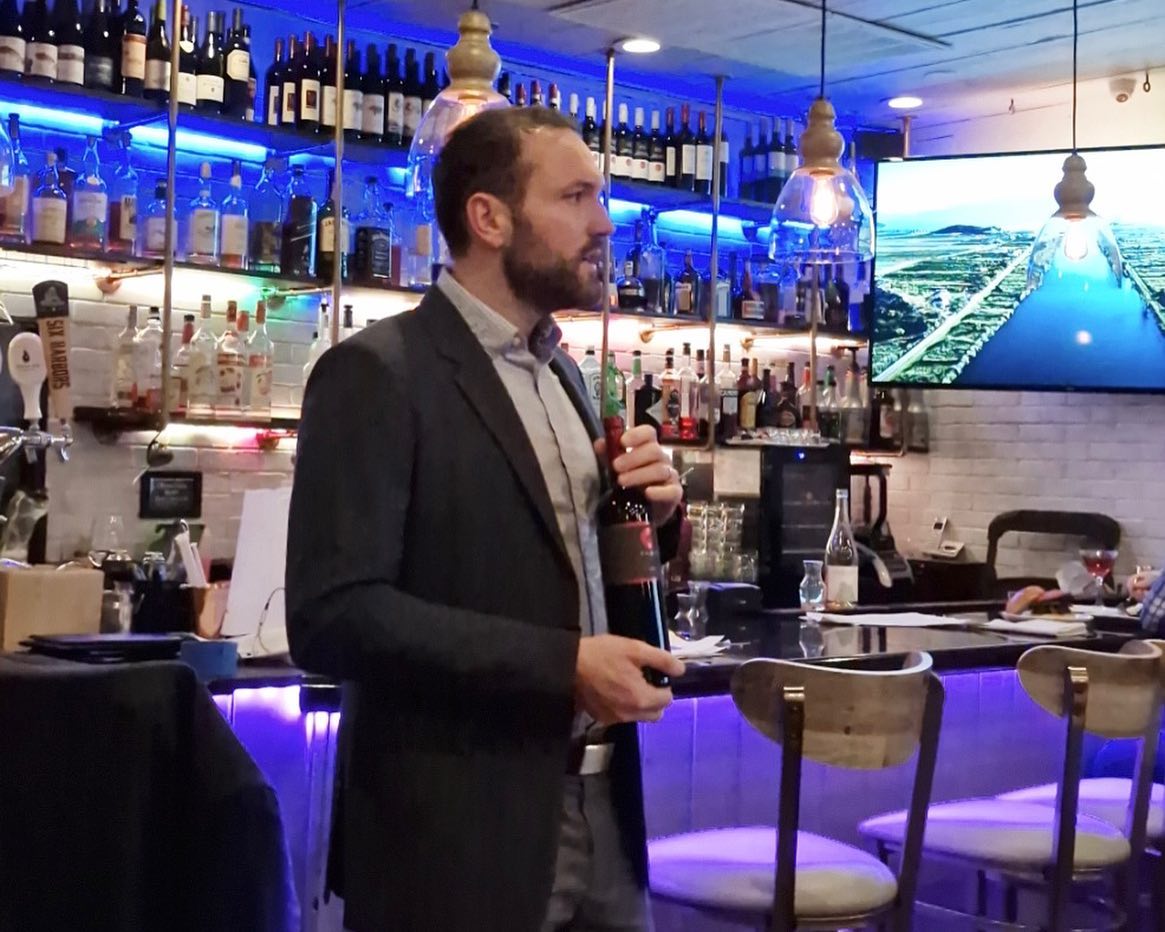
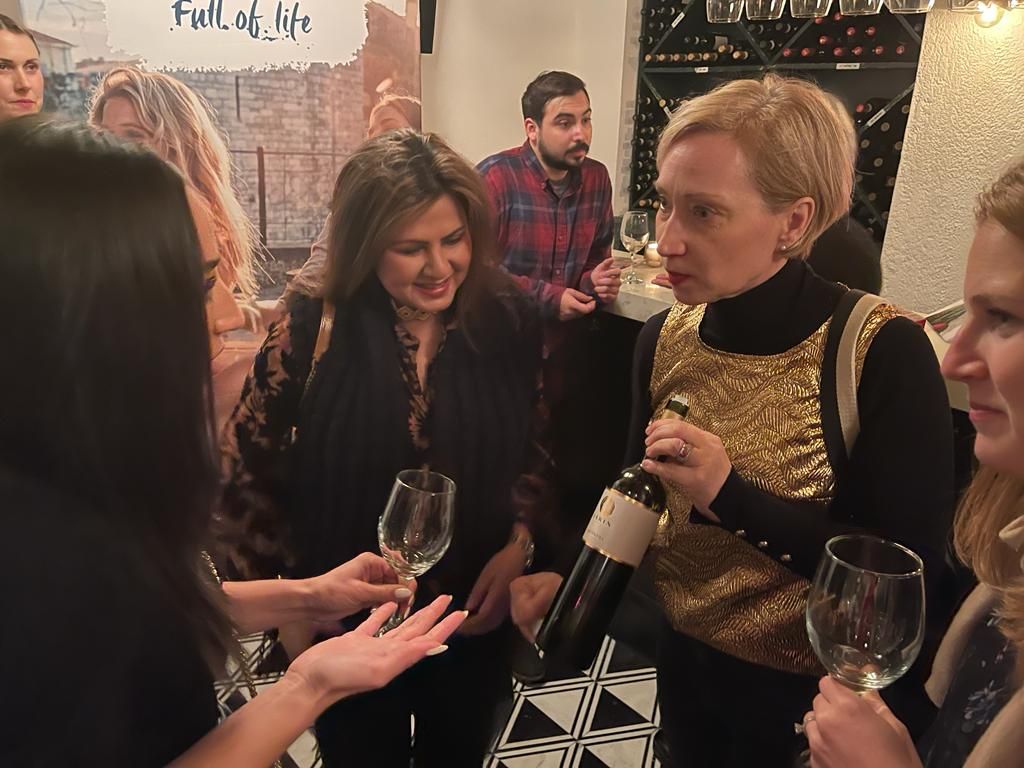
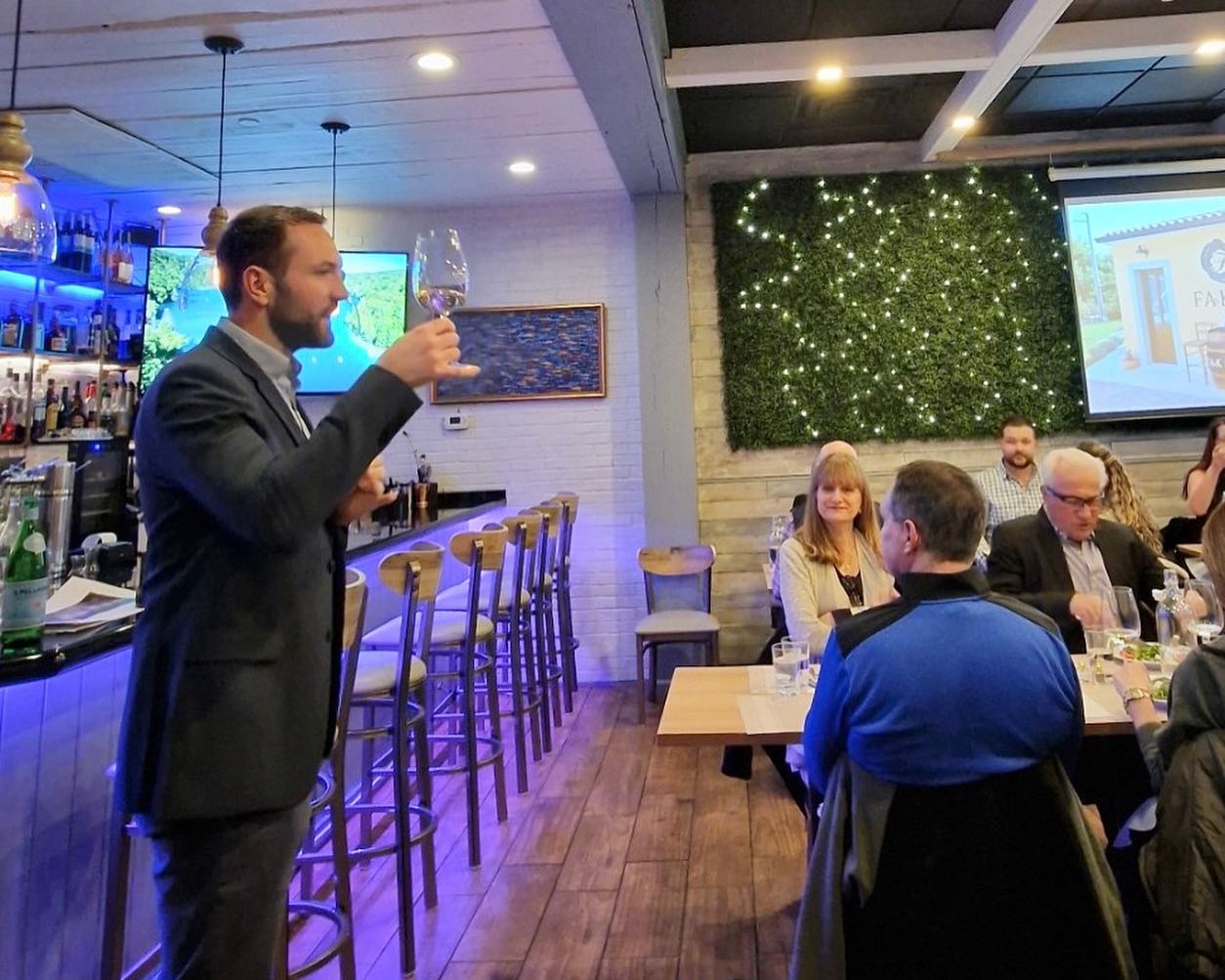
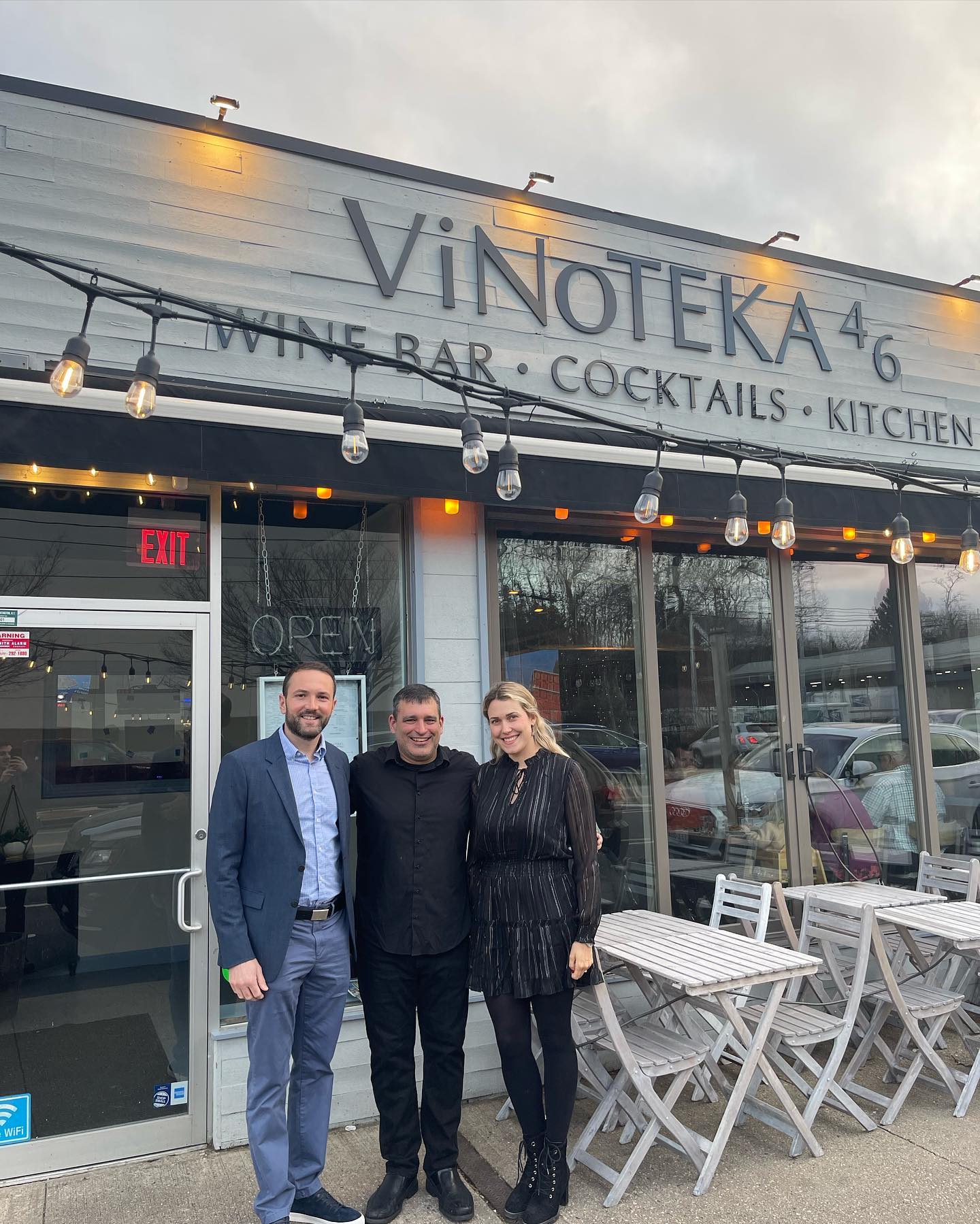
For more, check out our lifestyle section.
Graševina Wine Has Great Export Potential, Conference Hears
ZAGREB, 27 May 2022 - Graševina, that is Welschriesling, a white wine grape variety, is the most important and most prevalent wine variety in Croatia with great export potential but a lot of effort is needed for this wine to become known outside Croatia, it was heard at an international conference - GO - Graševina Osijek.
The conference was organised by the Croatian Agriculture and Food Agency (HAPIH), Osijek-Baranja County Tourist Board and the Graševina Croatica Association as part of the Wine Tour Across Borders project that is co-financed through the Hungary-Croatia EU Programme.
HAPIH Director Darja Sokolić said that in 2020 37,000 tonnes of Graševina grapes were produced, or 44% of Croatia's total grape production, producing 255,000 hectolitres of Graševina wine which is almost 40% of all the wine produced in Croatia.
More than 40% of the wine placed on the Croatian market is Graševina which comes in all wine categories -- table wine, quality wine, quality wine, classy wine and even a sparkling, Sokolić said, adding that she sees great potential in that wine variety.
President of Graševina Croatica Josip Pavić believes that in reference to laboratory and organoleptic evaluation, Slavonia and the Danube region produce the best quality wines but they have a lower sales price and low market potential.
Hence, he said, it is necessary to promote Graševina through wine and gastronomic tourism and a wine development strategy that will enable significant investment.
For more, check out our lifestyle section.
12th World of Malvasia: International Evaluation for Vinistra
April 24, 2021 - The best overture for Vinistra is the international evaluation of the World of Malvasia, which took place for the 12th time, in the Parentium Plava Laguna hotel in Poreč, which from year to year breaks records in terms of quality and number of samples. Thus, 435 samples of wine and spirits arrived for this year's evaluation, of which 220 samples were Malvasia.
As hrturizam.hr reports, a new name on the wine scene, Denis Bernobić from Markovac near Višnjan, won the championship title in the category of fresh Malvasia. Competing with three other top Malvasias, his wine took the win. This is also the biggest surprise at evaluating wine and spirits and the 12th World of Malvasia, which was traditionally held in mid-April at the Parentium Plava Laguna Hotel in Poreč.
"The lineage has always been the foundation of the existence of us Istrians. My family has been in winemaking for four generations, but the focus has been on top-quality wines for the last few years. The championship title is a great success, I must admit a surprise, but also recognition and encouragement to continue in the same direction", said Denis Bernobić.
Malvasia Collina from the 2016 winery Cattunar from Nova Vas near Brtonigla is the champion in the category of mature Malvasia; Teran Barbarossa, Vina Tomaz from Motovun, won the championship title in the fresh Teran category; while in the mature category, that title went to the wine of Santa Lucia from 2018. Kozlović Winery from Momjan.
In the category of mature refoška, the champion is Capo d’Istria from 2013, Slovenian Vinakoper, and five big gold medals were awarded to wines that won more than 92 points. These are the 2015 San Salvatore Muscat White Benvenuti wines from Caldir; Muscat yellow from 2019. Capo wine from Fernetić; Malvasia volcanica from 1956 by Spanish manufacturer El Grifo Canari; Merlot from 2017 Siljan wines from Krnica, and Aura biska extra from 2021 from the Buzet distillery Aura also won big gold.
"We are extremely pleased that we have managed to organize such a demanding competition in these unusual times. I am pleased with the top quality of the champion wines and the fact that as many as five wines crossed the threshold of 92 points and won great gold", said Nikola Benvenuti in front of Vinistra.
Another 139 gold and 16 silver medals were awarded, while other manufacturers received diplomas. This year, the right to the IQ label - Istrian quality was exercised by 24 winemakers for Malvasia and seven winemakers for Teran.
The IQ - Istrian quality label is primarily intended to label high-quality wines produced from Istrian and Teran Malvasia grapes and encourage the development of production of these indigenous wines, raising the level of their quality production technologies and promotion and sales on the domestic and world markets. The IQ mark enables the consumer to recognize those Istrian wines whose quality is higher than the quality prescribed by the law for quality wines with the geographical origin and higher than what the customer usually requires and expects.
This is a unique, active wine control system in Croatia where winemakers themselves gradually raise the scoring threshold for wines bearing the IQ - Istrian Quality label to standardize and increase product quality. The IQ label guarantees an active quality control system that takes place on four levels: in the vineyard (yield control), in the cellar (vinification control), chemical analysis, and organoleptic evaluation, and after the label is awarded, market control is performed.
This is precisely how the quality of the wine region is strategically raised and branded. It is important to emphasize that the Association of Winemakers and Winegrowers of Istria was founded in 1994. Therefore, it is a continuous process and strategic goal of raising Istrian wines and branding Istria as a wine region.
Great results and championship titles are the best announcement of the 27th Vinistra, which is being held in the open air for the first time this year, in the Peškera bay in Poreč. Although it was initially announced that the 27th in a row Vinistra will be held from 7 to 9 May in Poreč, due to the epidemiological situation throughout Croatia, the organizers announced that they are changing the date and place of the event.
The exact date is not yet known. For now, the focus is on June. The organizers of Vinistra are optimistic and do not give up on organizing this year's Vinistra.
To find out more about Croatian Wine, click HERE.
27th Vinistra Wine Manifestation Comes Back to Poreč in May 2021
March 2, 2021 – Good news for all wine lovers, experts, and winemakers, as the 27th Vinistra wine manifestation will take place from 7 to 9 May 2021 in Poreč, together with its traditional overture, 12th International Evaluation "World of Malvasia."
If there are no surprises and if the epidemiological measures allow it, the 27th Vinistra wine manifestation will be held this year after a one-year break due to the coronavirus pandemic. The preparations are underway, and this year's organizers have a somewhat more difficult task because everything should follow the Headquarters' measures and recommendations.
"As we did not hold the traditional En Primeur in Zagreb this year due to epidemiological measures, Vinistra will be an excellent opportunity to present new vintage wines, excellent in all characteristics, especially for red varieties. For us winemakers, the only positive side of 2020 was the exceptional harvest. The last two years have hit the wine and tourism sector hard, so we are very much looking forward to this year's event, meeting our partners, customers, and lovers of Istrian wines," said Nikola Benvenuti, president of Vinistra, winemakers' association, and winegrower.
He adds that the location and accompanying program will depend on epidemiological measures.
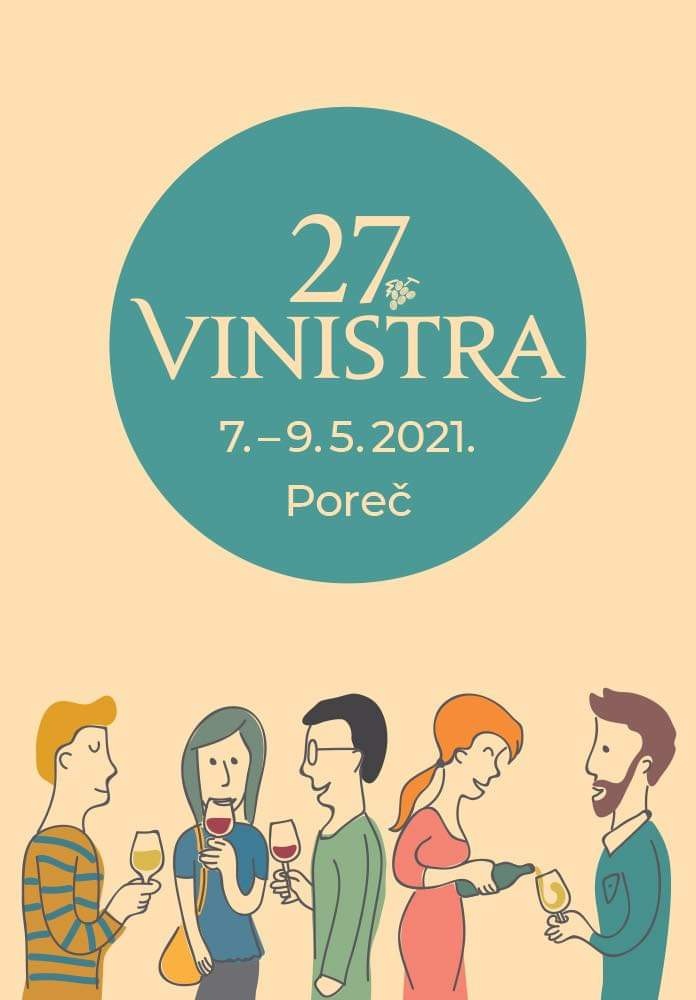
Vinistra
Traditionally, the best overture for Vinistra is the international evaluation named the World of Malvasia, which will be held for the 12th time, from April 12 to 16, 2021, at the Parentium Plava Laguna Hotel in Poreč. Year after year, the World of Malvasia breaks records in quality and number of samples.
"The informal world championship of the most famous Istrian variety is being held this year as part of a three-day international evaluation of wine and spirits, which brings together the most famous wine experts from Croatia and the region. Of course, everything will be in line with epidemiological measures because our health and safety come first. As usual, the evaluation results will be made public as part of the 27th Vinistra," says Benvenuti.
As 24sata recalls, the traditional Vinistra fair was held in the Žatika hall in Poreč for years before the tradition was interrupted for the first time last year due to the coronavirus pandemic. Almost all important politicians, presidents, businessmen used to come to Vinistra, as well as those who wanted to be photographed or filmed by journalists while they are enjoying the top drops of 'grape' juice.
Vinistra is a regional and international exhibition of Istrian wines and equipment for viticulture and winemaking. The longest-running exhibition of this type is traditionally held in the Istrian town of Poreč. The fair consists of an evaluation and exhibition part, and besides wine, olive oils and brandies are also evaluated.
Istria is continually improving wine quality and is a top eno-gastronomic destination. This is confirmed by the constant increase in the number of indigenous varieties' samples, more quality of average wine samples, and new names awarded by an expert jury every year.
To read more about lifestyle in Croatia, follow TCN's dedicated page.
Vinart Grand Tasting: Biggest Wine Event in Croatia to be Held in Spring 2021
January 29, 2021 – Winemakers are delighted as it's announced that the Vinart Grand Tasting, the most important business wine event, will take place in the spring of 2021.
As Turizam24 reports, the Vinart Grand Tasting will be held on April 30 and May 1, 2021, in Zagreb's Lauba. The organizer, the company Vinart, moved the fair's date from the beginning of March to the beginning of May due to the uncertainty of the epidemiological situation and the duration of anti-epidemic measures.
As a reminder, last year's Vinart Grand Tasting was the last professional wine fair in Europe. It was held on March 6 and 7, 2020, just before the first lockdown, while many details about the COVID-19 virus were unknown.
"It was uncertain until the last second, and in the weeks before the fair itself, we practically didn't sleep because of worries. We prepared the program, and after the fair, we organized a study trip to Croatian wine regions for a group of about twenty important European and American journalists. We invested a considerable amount of money, hoping that we would make a big step to recognize Croatian wines and winemakers globally, and everything was so risky and uncertain. In the end, only three journalists canceled our trip, and others came and were delighted with the offer and quality of Croatian wines. We did everything in our power to eliminate the risk of transmitting the virus," says Saša Špiranec, director of Vinart.
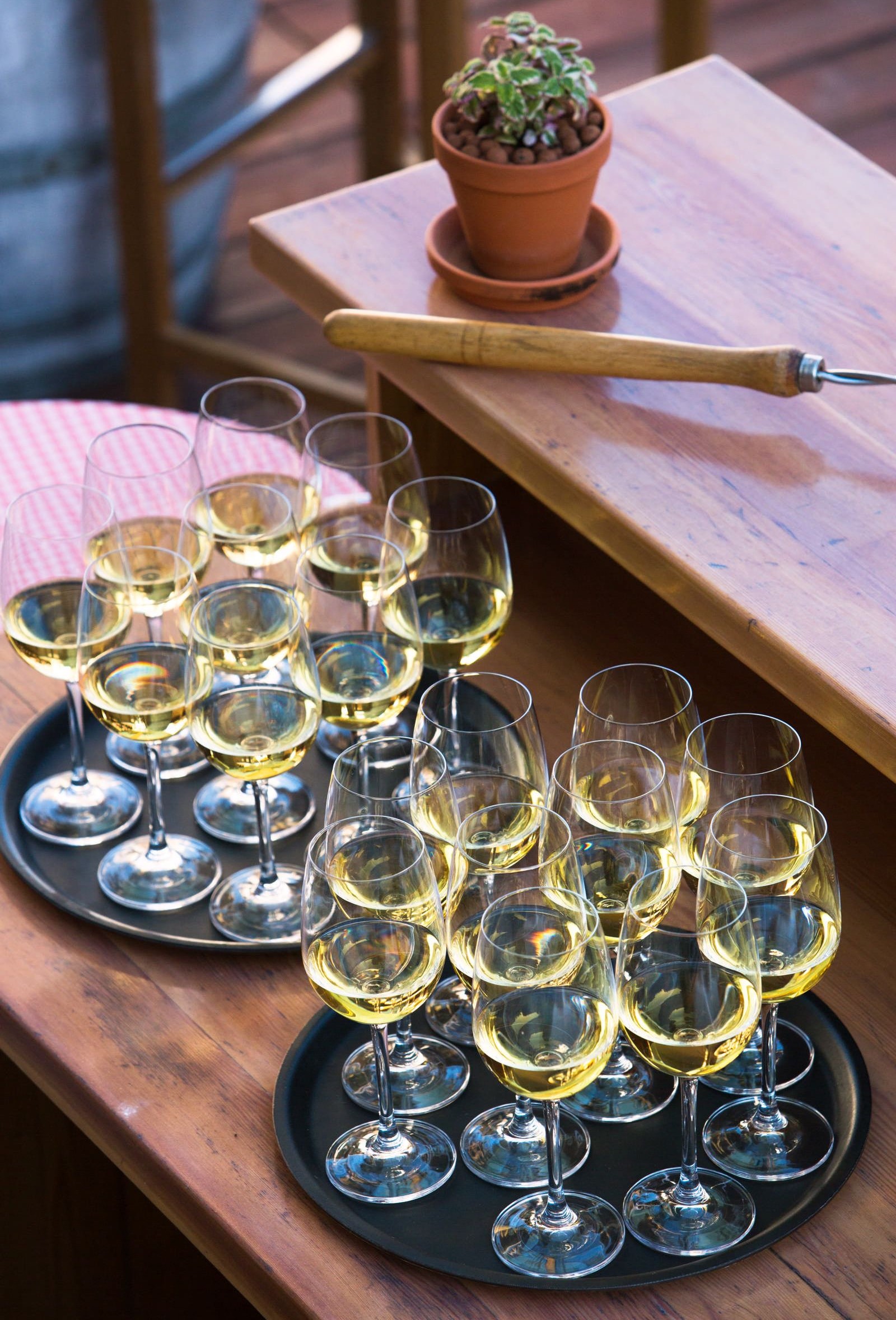
Wine tasting / Copyright Romulić and Stojčić
At last year's fair, there was no information that anyone had become infected. From that experience, they are ready to boldly enter into the preparation of this year's edition of the fair.
If the economy doesn't restart in May, we can say goodbye to winemaking
On this occasion, Špiranec answered questions about the situation in winemaking after the pandemic 2020. As expected, the autumn wave caused the most significant damage to this branch of the economy, extremely important for the tourism sector.
"Judging by the comments we received from winemakers, last year's drop in turnover was more than obvious. Different wineries have different experiences, but the average should be between 20 and 30 percent drop overall. The year's start was a shock, and sales stalled, but a good spring and early summer made up for that decline. The second, autumn wave did more damage that was only partially offset by sales in December when many winemakers had good results in direct sales due to gifts and increased household consumption. If such problems remained in 2021, they would surely become insurmountable for many wineries. If the situation after the Easter moves towards full normalization, then most wineries will recover," said Špiranec, who explained the chosen date in the still uncertain first part of 2021.
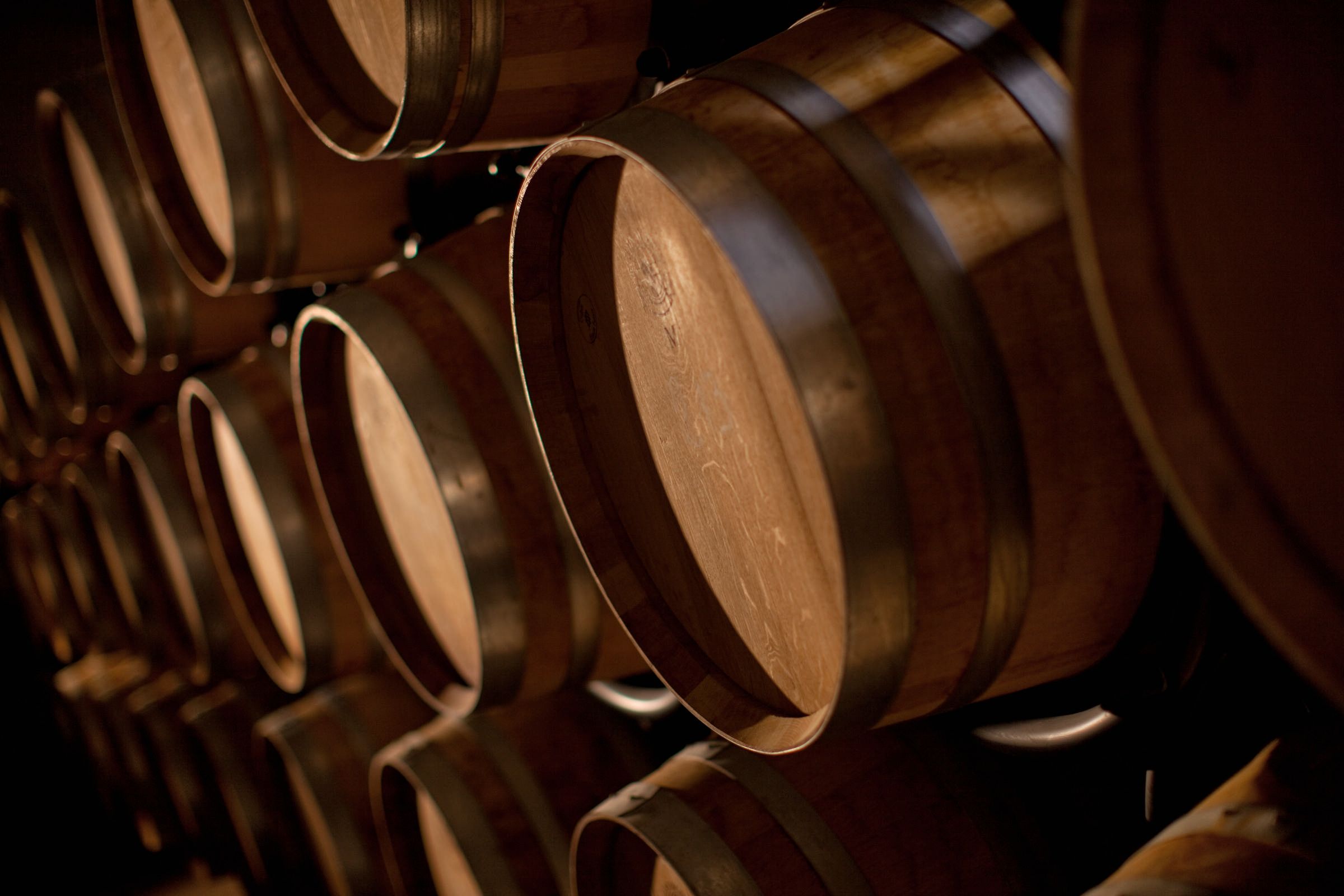
Copyright Romulić and Stojčić
"We have chosen dates when spring will already be in full swing. The days are long and sunny, and we believe that in the meantime, the measures and vaccination will significantly reduce the risks. We think May is the last moment for normalization, regardless of the circumstances with COVID-19, and that is why we chose the first days of May for the fair. If the economy does not start working normally in May, we can say goodbye to winemaking as its branch," concluded Špiranec, the leading Croatian expert in winemaking.
This announcement speaks best about the consequences of a pandemic. They hope that the situation will normalize after Easter. In that case, we can still expect the recovery of most stakeholders on the wine scene.
2021 is crucial for winemaking
Winemakers and wine business people are delighted by the announcement of the Vinart Grand Tasting.
"The capacity, which is further limited this year, is almost full after the first week of opening the applications. Winemakers and their customers send us numerous messages that they cannot wait for the fair and the start of activities and wine events. Now, things that they used to complain about, like too many fairs and trips, seem to them to be a blessing compared to this past year of passively waiting and staring into space," announces Špiranec.
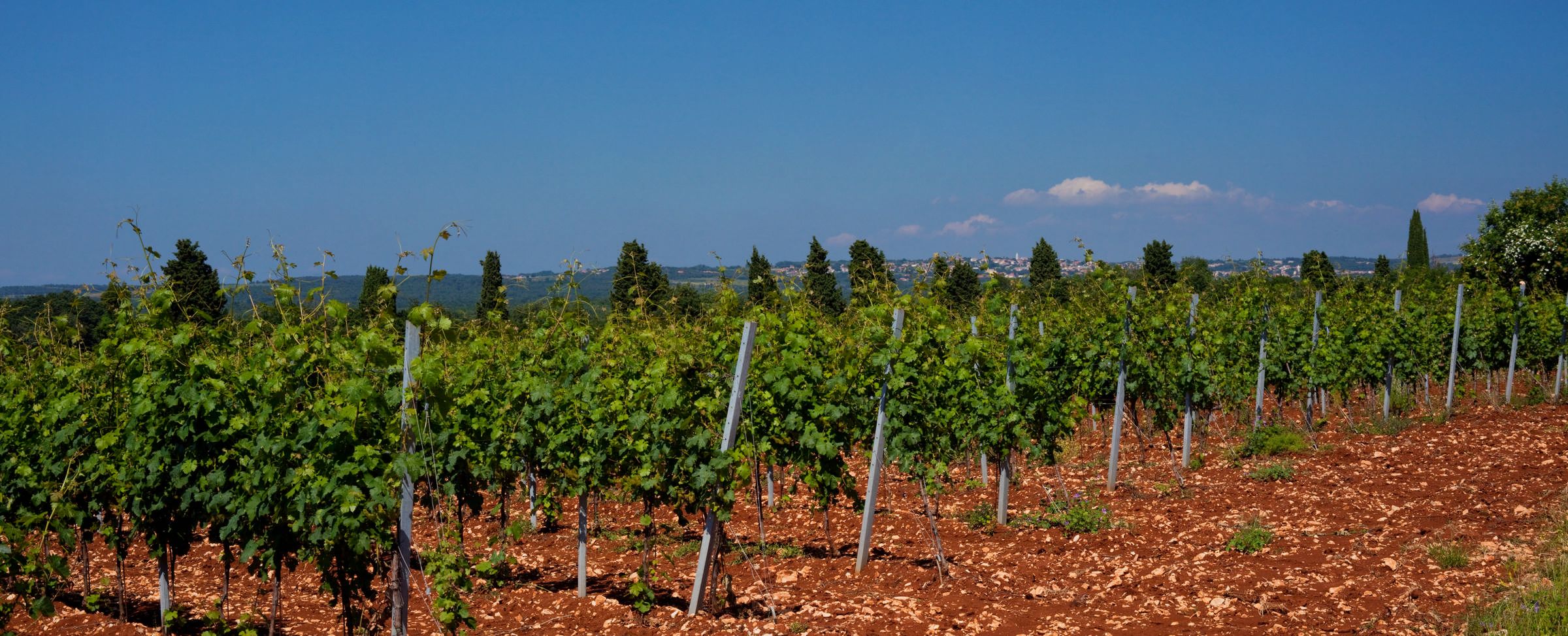
Vineyard in Istria / Copyright Romulić and Stojčić
It is evident that this year is crucial for winemaking. Without the opening and launch of the economy in the spring, there will be no winemaking. It remains to be seen how the situation will develop by May, but any such announcement and event that gives hope that the recovery will begin soon is optimistic. For winemakers, as well as for caterers, it is necessary to start economic activities no later than Easter. Otherwise, we will have a total collapse.
To read more about lifestyle in Croatia, follow TCN's dedicated page.
Ludbreg Winemakers' Wines Thrive Due to God-Given Microclimate
January 23, 2021 – The feast of St Vincent's Day, Vincekovo, could not be celebrated this year due to the epidemiological situation, but Ludbreg winemakers continue to focus on their wine production. Thanks to the very favorable climate, the Ludbreg area is suitable for planting vineyards, and local winemakers hope to soon get their well-deserved place on the Croatia's wine list.
Vincekovo, which was celebrated yesterday, January 22, in the Ludbreg area, used to be celebrated in Globočec when the plantations were blessed. The main event was a traditional and unique exhibition of young wines from the Ludbreg and surrounding vineyards, which was canceled this year due to strict epidemiological measures and a challenging situation.
It is an additional blow for all caterers who suffered the most in the corona crisis and wine producers. Local winemakers and winegrowers will wait for some better times to meet and rejoice with friends.
Sanja and Tomislav Stručić, top winemakers from Ludbreg, who met with TCN in Ludbreg last year, told their business story for the Epodravina.hr portal.
Family vineyard three kilometers from the center of the world
"We were pleased by the announcement that we could reopen our doors in February, but if we won't open until Easter, as announced, the season is questionable. We are very affected," says winemaker Sanja Stručić.
However, despite the pandemic, wine lovers are not resting. Caring for the vineyards is a year-round work, essential for producing good wine. The season begins now when the first pruning is done and lasts until the harvest.
"Last year, we estimated that, given the situation with the coronavirus, we would have stocks of wine. Therefore, we reduced the grape yield during pruning in the spring. We left grapes for sparkling wine and wines to age. We want to produce quality, not quantity, that is, high-quality wines," says the Stručić family.

Sanja and Tomislav Stručić with Paul Bradbury in 2020, Total Croatia News
Their beautiful wine-growing hills, clean air, excellent wine, and hospitality evoke the love of land and viticulture that began in 1984 with a family vineyard just three kilometers from the center of the world. Sanja's father, Dragutin Crnković, once planted the first vineyard there, passed on his love of viticulture to his daughter, and introduced her to the wine business.
Emphasis is on the premium line of nature wines
Sanja's husband, Tomislav, also fell in love with winemaking and viticulture. In 2000 they founded the Winery, and in 2017 they produced the first sparkling wine in the region. They are the new wine style leaders in Varaždin County, and today they create top and quality wines.
Stručić Winery has become one of the most famous and successful and began more severe production in 2002. The emphasis is on the premium line of wines represented by nature wines. The premium line consists of carefully selected bunches hand-picked from selected vines. Sanja showed her love, passion, and care for each of these grapes before they become wine.
"Only ripe grapes are picked from the petiole by hand, clean and healthy. Fermentation on own yeasts and grapes, without the addition of selected yeasts, produces natural wines. This top line comes in different bottles and has different labels. We have been making it in small batches, approximately 750 bottles, for four years now, every year with a new vintage," says Sanja.
Back in 2016, Stručić family even produced a special edition of Sara Kolak Chardonnay to celebrate the local Olympic javelin gold-medal winner.
Journalists who encourage stories about gastronomy, tourism, and hedonism are also responsible for the turn in wine production. The Stručić family decided to take advantage of the microclimate and their plantations' position, which enable them to produce excellent raw materials for the production of different wine styles.
"We researched and realized that our region is a microclimatic God-given. While visiting various wine fairs and festivals, we realized we want to make different wines. The exhibitions were an incentive for us to expand our knowledge to be as good as possible. We also visited wineries in Italy to get a better insight into their viticulture and winemaking that is at a high level, and to apply experiences and some wine secrets in our vineyard and cellar," says Sanja on how they started producing sparkling wine and natural wine.
Produced the first sparkling wine in the region
The family vineyard initially had 3,500 vines and was later expanded with new plantations. Today, they cultivate three and a half hectares of land with 14,000 vines. It consists of plots named after the youngest members: Lucija, Luka, and Petra, and the newest plantation was named after their niece Katarina. The plots are registered by varieties and years of planting. The rulers of their vineyard are Graševina, Chardonnay, Rhine Riesling, Sauvignon, Portuguese and Yellow Muscat.
"We produce Graševina, Chardonnay, Sauvignon, Rhine Riesling, and mixed wines. Poštenjak is a blend – a mixture of Graševina, Chardonnay, and Pinot Gris. We make fruit wines and liqueurs, and sparkling wine. We produce about 25,000 bottles a year," says Tomislav.
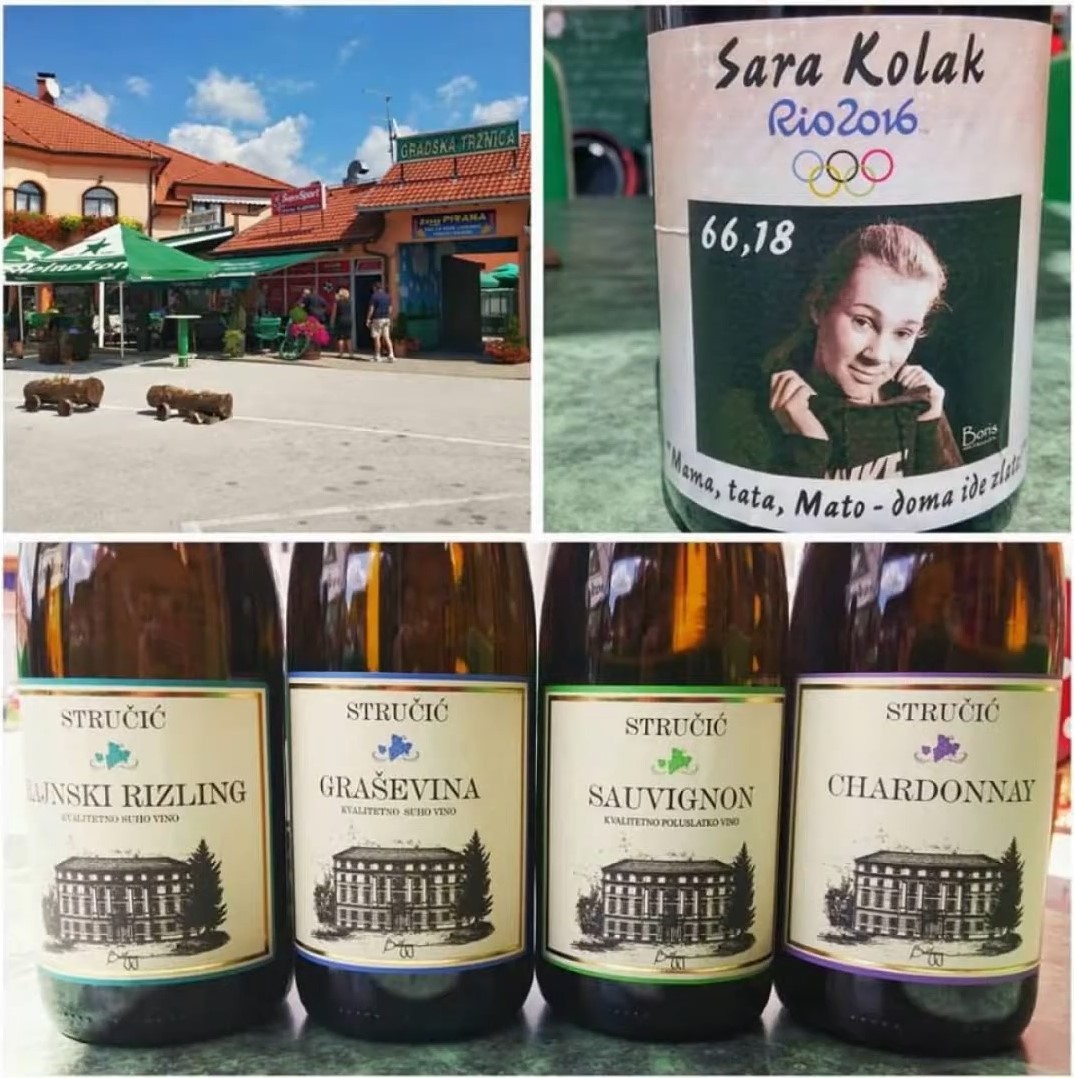
The opening of the Ludbreg Wine Road about ten years ago encouraged a stronger development of their winery. Thus, in 2017, Vinarija Stručić produced the first sparkling wine from the Ludbreg vineyards, which has the label "blanc de blancs" (namely "white from white"), which means that only white grapes were used in its production, that is, Chardonnay.
"After top quality wines, every winemaker wants to produce sparkling wine. It is the crown of your work, as if, for example, you have won the World Cup. The production of sparkling wine was our desire for a step higher. And now, three years ago, we are doing batch after batch," Sanja points out.
The Croatian Wine Institute, which evaluates and issues a quality certificate, rated their sparkling wine as top quality. And there is only five percent of top wines in Croatia, so they expanded their production in 2018 with rose sparkling wine from the Portuguese. It is a unique rarity in Croatia, produced by only one other winemaker on Plješivica.
Microclimatic conditions with a continental climate favor the quality ripening of grapes, so the Podravina and Zagorje regions are God-given for sparkling wine production. The Ludbreg vineyards' climate is ideal for producing light wines with little alcohol, sparkling wine, and wines of late harvests.
Decanter quality certification
Stručić Winery sells its products throughout Croatia. In Ludbreg, visitors can taste their wines in the Bonaparte coffee bar, which they own, as well as the Amalia catering facilities, Pivnica Mejaši, and Hotel Crnković.

"Rhine Riesling is mostly associated with the name of our winery. It is our flagship and our most sought after wine on the market. Then follow Graševina, Chardonnay, Portuguese, Sauvignon… Premium wine lines, sparkling wines, aged, and nature wines are distributed to the Adriatic coast," says Tomislav.
The secret behind the Sučić Winerys's success, Sanja points out, is harmony, great love, patience, a lot of sacrifices, and constant investments. Proof of quality arrived last August when the Stručić Winery won a bronze medal for Chardonnay and recommendations for Rhine Riesling and Graševina at the most influential wine evaluation – the Decanter World Wine Awards 2020 in London.
"It is a confirmation that we make quality wine. With these recognitions, we have increased visibility," says Tomislav with satisfaction.
Ludbreg vineyards on the wine list of Croatia
For wines to achieve top results, a lot of education, work, and knowledge is needed, so the Stručić family cooperates with the leading Croatian sommelier and Decanter judge Siniša Lasan. With Varaždin County's cooperation, Siniša visited several wineries and tasted wines, discussed problems, and gave his view of the current situation in winemaking in the county.

Continental tourism is in the beginning. Tourism Ministry began to give it importance and encourage it only a few years ago.
"The Ludbreg and Varaždin vineyards are neglected. They are not marked on Croatia's wine list, and our winemakers are very hardworking but self-effacing. A dozen of us from all over the county will have to sit down, compare wines, listen to the profession to style them if necessary so that we stand out together with quality. I believe that we will soon mark our vineyards on the wine list, which would raise the price, and we could sell our wines more easily on the doorstep," Sanja is optimistic.
"Viticulture is a demanding activity that requires a lot of attention because wine is alive and should be continuously monitored. Without love for the vineyard and wine, there is no progress, "the Stručić couple agrees.
However, the biggest reward in their work is that the interest in winemaking is shown by their 17-year-old son Luka. He wants to enroll at the Faculty of Agriculture and become a wine expert, oenologist. Thus, when the time comes, to the family's satisfaction, the winery will be taken over by the third generation, which will cultivate, enrich, and further create new top-notch wines.
To read more about Ludbreg, follow our dedicated page.
Croatian Family Wine Businesses Even Attracting Americans
Plešivica is an oasis for lovers of traditional gastronomy and wine-making, a longtime favourite destination for many of Zagreb's residents, Plešivica is famous for its many vineyards, wineries, sparkling wines and traditional food. Several Croatian family wine stories are attracting attention even from across the Atlantic.
As Marta Duic/Poslovni Dnevnik writes on the 18th of January, 2019, the Šember Winery, located in the village of Donji Pavlovčani, is famous for its sparkling wines that have been produced in their vinery for years. Ivanka Šember, the wife of a winery owner who helps him run the family business, says their sparkling wines are produced from old varieties which grow only on Plešivica. They have an old vineyard with fifteen different old and almost forgotten varieties, to which winemaker Zdenko Šember gives his special attention. He inherited this vineyard from his late grandmother and has since turned it into a flourishing business.
This year, this Croatian family winery business also produced a variety of new wine sparkling wines, a white sparkling wine from a black pinot, a sparkling wine of the old varieties which were kept in clay pots originating from Georgia. The production of amphora wines deeply buried in the ground is an extremely old tradition over in Georgia, and today many Croatian winemakers use this method. This method of wine production makes each wine, including sparkling wine from the assortment of this winery, completely different in flavour when compared to others.
"My husband loves experiments, and some of them also get to see the market!" said Ivanka Šember. The Šember Winery is one of the few in the Republic of Croatia which manually produces its sparkling wines, each step done with their own hands and without any machines. As the Croatian family say themselves, everything has been made even easier since they obtained a new 320m cellar. In the construction of the cellar, which was co-funded through the National Wine Sector Support Program, this wine oriented Croatian family invested more than two million kuna, and their plans for this year are to further expand their vineyards by another three hectares.
"When it comes to our sparkling wines, our best sellers are rose, this year we have doubled our production, and we're currently producing 40,000 bottles. We're the first winery to have been producing sparkling wines from old Plešivica varieties, explained Ivanka Šember.
Located in the village of Lokošin Dol, the Braje Winery is known for its homemade food served with homemade wine. Robert Braje is the winemaker in this Croatian family, and his wife, Sandra, is an expert in local gastronomy and has been the chef in their restaurant for the last eight years. In this Croatian family business, their son shows interest in wine production, and Robert says that if this continues, he will soon expand his vineyards, which today already stretch to 3.5 hectares.
They purchase only a very small amount of their grapes, and from varieties that have a special emphasis on Red Waltz, an Austrian variety which is only offered by very, very few here in Croatia. As is the case with many Croatian wineries, the Braje Winery also serves numerous homemade dishes which pair well with the selection of wines that they produce and offer to their guests.
"From the very beginning, we've been doing everything business-wise as a real family. We produce 15,000 to 18,000,000 litres of wine, and a third of all that is sold right here at our very door. We also prepare meals from either our own or other locally grown vegetables, we make our own apple and pear juices. We have ducks, chickens, pigs, and a cow,'' explained Braje.
Their goal is to locally produce food and wine for their guests, in order to get them to notice and appreciate the distinct differences. "I cook and prepare everything, which is almost all made from local ingredients, we have a cow so that we can have our fresh cheese, cream and milk, eggs from our chickens, sausage and bacon from our pigs, and if we don't have enough of our own vegetables, we buy it from other producers in the neighbourhood. I make homemade bread, pasta, noodles... Our guests come either individually or in small groups, and we have many guests from the USA,'' noted Sandra Braje.
Režek Winery is yet another traditional Croatian family business that Damir Režek inherited from his father, Drago. "Our story began with my great-grandfather Roko, who had 40,000 vines, and the most famous type he had was a Portuguese variety. That Portuguese variety is the very story of my family and I'm glad that this slightly forgotten variety has now been revived, and my grandfather later brought new varieties, such as sauvignon, and was one of the largest producers in this region,'' stated Damir Režek.
The last vineyard was planted back in 2005, so now they have four hectares and about 20,000 vineyards.
Vinarija Kolarić in Hrastje Plešivičko is known for its rich homemade food, wines, and sparkling wines. Franjo Kolarić has a restaurant and since 2009 a mini hotel with sixteen rooms in which he has invested more than three million kuna. As he says, he's typically full from May to October. A warehouse for sparkling wine was built back in 1997 and Franjo is currently working on a new line of sparkling wines, in which he planning to invest 1.5 million kuna.
Thanks to the extension of the restaurant there is now seating for more than 170 people, and in addition to the sixteen rooms currently available, he plans to build an apartment this spring. In addition to all of the above, one of his plans is to build a small brewery and produce small quantities of craft beer.
Make sure to stay up to date by following our dedicated lifestyle page. If it's just wine you're interested in, give Total Croatia Wine a follow.
Click here for the original article by Marta Duic for Poslovni Dnevnik
The State of “Plah-vatz”: Croatian Wines on the U.S. Market
A fascinating account of the history, progress and challenges of Croatian wine importing into the competitive American market. By a man who knows.
I am delighted that Croatian wine pioneer Cliff Rames, agreed to makes some contributions to the Total Croatia News team. Cliff, whose outstanding Wines of Croatia blog has both been a premier source of information for people interested in Croatian wine, as well as a window to the world for many young and lesser-known winemakers, has a unique insight into Croatian wine in America, from his standpoint in New York City.
This article is destined for a permanent home on Total Croatia News, but as we are still a few days from launching, I thought it would be nice to share here.
Thanks Cliff, your support is appreciated. If you would like to contribute to Total Croatia News, we would love to hear from you on This email address is being protected from spambots. You need JavaScript enabled to view it. or why not join us on Facebook?
Over to young Cliff...
It’s nearly a decade ago. A shipping container quietly slips into the port of New York. Inside its cold, dark belly, a precious cargo waits to be released. Several tense days follow as US Customs officials scrutinize paperwork and examine the contents: just one mistake, or one mislabeled item, and the whole lot could be confiscated and destroyed.
The “all clear” is given at last. A truck rolls up to the dock and several plastic-wrapped pallets are stowed and motored away to a warehouse in the suburbs of Long Island. Behind the wheel, Daniel Pedisich sweats and worries, attentively avoiding every pot hole and maneuvering each curve in the road with precision to ensure the safety of his fragile freight. Questions race through his mind. Will people like them? Can I sell them? Is there a future in this? But in his gut he knows the answer, and he presses on with inspired resolve.
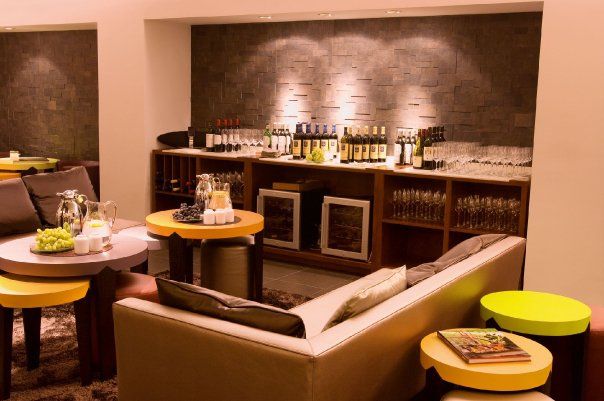
That was 2006. And if Pedisich could have his way, America would soon fall in love with Croatian vino—or, as a starting point—the wines of Bibich, a boutique family winery from Skradin, not far from Croatia’s gorgeous Adriatic coast. Pedisich had met Bibich owner and winemaker, Alen Bibic, while on vacation and became convinced that Croatian wines warranted a place on the US market. Armed with a truck load of bottles bearing labels with funny names like Debit, Plavina, Babic, and Lasina, he was determined to introduce them to thirsty Americans.
“My inspiration was the Zinfandel story,” he recalls. “I knew Croatia had the potential to produce world class wines. I hoped that the story of Zinfandel’s origins in Croatia would add a level of familiarity and make a connection with consumers.”
I remember meeting Pedisich at an in-store tasting in Manhattan, where he poured tastes of Bibich for unsuspecting wine shop wanderers.

Although I was unfamiliar with Bibich wines at the time, I instantly recognized the aromas and flavors swirling in my glass; they transported me to the the Adriatic seaside with its jagged white stones and red earth; fig and olive trees; and delightful days gathered around tables of friends and relatives, celebrating the rituals of eating and drinking—and the simplicity of being. Surely, Americans would see the beauty in these wines, we declared.
“The biggest challenge back then, and remains so today, is recognition,” reflects Pedisich. “Many people still do not realize that Croatia is an ancient wine region with many interesting native varieties. Yet I believe we helped to build a strong foundation for the future. It’s still a niche market but one that possesses a lot of potential to expand.”
Since the early days of Bibich, the portfolio of Croatian wineries exporting to the US has blossomed to more than two dozen. Native varieties such as Babic, Bogdanuša, Crljenak Kaštelanski (Zinfandel), Debit, Graševina, Malvazija Istarska, Plavac Mali, Plavina, Pošip, Teran, Žlahtina, and even Škrlet and Sansigot can now be spotted on the wine lists of restaurants and shelves of wine shops in Boston, Chicago, Los Angeles, Miami, New York City, Portland (Maine), San Francisco, and Washington DC.
Wineries that presently have representation in America reads like a Who’s Who list of Croatia’s finest wine producing families and cooperatives: Androvic, Badel 1862, Belje, Bibich, Bura, Čara, Caric, Cattunar, Clai, Coronica, Dingac Vinarija, Dubrovacki Podrumi, Enjingi, Grgic, Istravino, Katunar, Korta Katarina, Kosovec, Kozlovic, Kriz, Matoševic, Miloš, Piquentum, Piližota, Plancic, Putnikovići, Skaramuca, Šipun, Toreta, Trapan, and Zlatan Otok.
For all the successes, challenges remain. Ten years of market presence has dimmed the luster of novelty among wine buyers and sommeliers who crave the excitement of new discoveries. Indeed, other regional competitors are already lining up with well-funded marketing campaigns. Bulgaria, Georgia, Moldova, and Turkey have all held high-profile tastings in the US recently and are garnering international awards, generating a buzz among buyers who perpetually seek—and expect—that sweet intersection of distinction, authenticity and value.

With so many options on an already flooded market, the key to getting noticed is “quality in the glass at an affordable price,” says Ilya Shchukin of Vinum USA, a New Jersey-based importer. “I get excited when I meet small producers who are willing to offer wine at a lower cost without compromising quality. It’s an investment that allows us to open the door and offer their wines to adventurous retailers and consumers who appreciate honest, hand-crafted wines from new regions and varieties. The Piližota Plavina is a fine example. We are now offering the third vintage and sales keep growing.”
According to Frank Dietrich, owner of San Francisco-based Blue Danube Wine Company (and current importer of Bibich wines, among many others), the popularity of artisanal wine bars and a new generation of curious and enthusiastic sommeliers has benefited Croatian wine sales. “Sommeliers are excited to feature Croatian wines. It's a testament to their engagement as professionals and shows their curiosity to explore the ever-expanding world of wine. They love it when they can help a customer discover something new and delicious; seeing the surprise is so rewarding. Buyers also appreciate that Croatian wines taste authentic and tell an interesting story of their terroir.”
Marko Babsek, a brand manager for Winebow, says the trick to making Croatian wines accessible is to feature them on By The Glass lists. “For an affordable price customers can taste them one glass at a time, get familiar with them, and learn the story of the producer and grape varieties. Familiarity reinforces comfort, and comfort instills confidence. A consumer who is happy is more likely to try something else at a higher price point.”
However, curious consumers who live far from urban centers find access to Croatian wines impeded by the constraints of distribution. Under US alcohol law, a distributor must apply for licenses for every state in which it intends to distribute, and then register each wine label it will distribute in those states—an administrative nightmare. Currently only Winebow (who imports Trapan) has national distribution reach, although others (Blue Danube Wine Company; Vinum USA) have collectively expanded their distribution network to nearly 20 states.
“Distribution is a major challenge,” observes Fred Dexheimer, Master Sommelier and operator of RX Wine Lab (a wine bar and education center) in

Durham, NC. “Once you travel beyond the large metropolitan areas like New York and San Francisco, it becomes harder and harder to find Croatian wines. People are generally excited by these wines. They have heard the buzz and want to try them. It’s frustrating when they cannot find them at the local shop or restaurant. With expanded distribution the wines will get into the hands of more tastemakers and trendsetters in smaller cities and areas where Croatian wines will be new and exciting.”
And which Croatian wines are selling best in America?
“The trend is definitely towards leaner style reds; crisp, unoaked, and mineral-driven whites; and fresh rosé,” reports Babsek. “These wines are super approachable and food-friendly. Lighter reds with less manipulation, more fruit, higher acidity and less alcohol are the way of the future for Croatian reds.”
Dietrich stresses that “the most successful wines are made from Croatia's unique, native grape varieties: Plavac Mali, Pošip, Teran, Malvasia, and of course, Graševina.”
Yet success hasn’t come easy. Responsibility for promotional activities and marketing has fallen mainly upon importers and individual producers, with the assistance of Wines of Croatia—an independent, non-governmental project that utilizes social media platforms to raise awareness and share information. While three grand tasting events—sponsored by Vina Croatia and the Croatian Chamber of Economy—were held in New York over the last five years (in 2011, 2013, and 2015), no additional resources have been invested by the Croatian government in US marketing initiatives.
Most professionals interviewed for this report agree, a sustained marketing campaign that includes frequent tastings and investment in promotional materials is essential to remain competitive, reach more buyers and consumers, and increase sales.
“It takes a lot of work to sell Croatian wines,” observes Dietrich. “We must always explain that Croatia has been producing wines for more than 2,000 years. We must overcome prejudice; some people still dismiss Eastern European wines as low quality. But we overcome it by sampling, explaining, telling the stories, and conducting return visits and follow-up.”
“It’s going to take many years, bottle by bottle, glass by glass,” echoes Pedisich. “But that should not stop anyone. There is still a lot of enthusiasm. Bibich and Trapan have a great model. These are two young winemakers who are patiently investing the time, money and effort in the US market. They visit frequently and personally visit buyers.”
Shchukin concurs: “The US market is the most competitive market in the world. The three-tier system will render your wines more expensive than you planned. Any producer who wants to succeed in the US should first come for a visit, talk to importers and retailers, see what’s selling, buy a bunch of bottles, taste, compare and calculate.”


